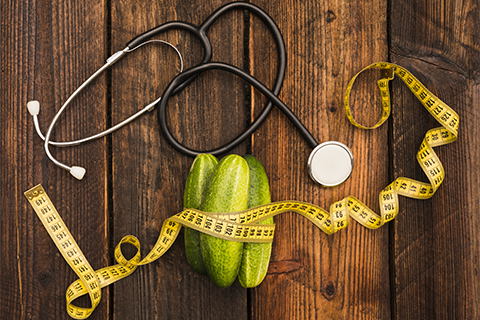January 25, 2023
Madhura Mohan
Diet Vs Exercise – Which Is More Important For Weight Loss?
I
n today’s social media-driven world, it’s too easy for people to share information on fitness without any factual backing! Not to say, social media is useless, social media hosts some beneficial information on fitness but has some woefully bad advice too.
While the truth about wrong information can become readily evident to fitness professionals, the average person who doesn’t have the same level of knowledge will quickly jump on such a bandwagon.
‘Diet Vs Exercise For Weight Loss’ is a heated debate on social media, where some advocate option A and others profess option B giving their own opinions and justifications.
Now, what’s your conception of this topic? Well, read the article completely to know the actual fact…
HOW DOES WEIGHT LOSS WORK?

Being overweight results from a complex set of interactions among genetic, behavioural, environmental factors, too little physical activity, and overeating related to energy expenditure.
Calorie intake and energy expenditure are the chief contributing factors to weight loss. 2000 calories a day for women and 2500 calories a day for men is the recommended daily calorie intake.
Your body uses the energy from the food you eat to perform tasks and energy consumed in excess will be stored as fat. What this conveys is, you can achieve weight loss when you create a calorie deficit in your body. So, how do you create a calorie deficit? When the amount of calories you expend is more than the number of calories you consume.
This means, to achieve weight loss, you should have a hold on what you eat and how much you expend.
As we advance in this blog, you’ll learn about the role of diet and exercise in achieving weight loss and if there is a connection between diet and exercise, you’ll get answers to the question, is diet more important than exercise or exercise is more important than diet for weight loss?
ROLE OF DIET IN WEIGHT LOSS

Cutting down on calories (calorie deficit) is the most important requisite for weight loss. A nutritionally balanced, hypocaloric diet is what dietitians suggest for those who wish to lose weight.
-
The diet you consume has a direct link to your body’s hormonal response and weight loss happens through your body’s response to certain foods.
-
Protein-rich foods fill you up, reduce post-meal hunger-hormone secretion (ghrelin), contribute to satiety, and reduce your calorie intake.
-
Fiber-rich foods slow your digestion and ensure a gradual rise in blood glucose levels, and trigger a slow release of insulin.
-
Ultra-processed foods are low in nutrients, and fiber, they’re digested fast, and hence cause a quick rise in blood sugar and insulin spikes. Insulin removes glucose from your bloodstream through fat storage.
High fat, processed food, and packaged foods encourage you to eat empty calories full of saturated fats and sugars. Whereas, whole grains, legumes, beans, fermented foods, potatoes, nuts, olive oil, avocados, a variety of colourful fruits and veggies, poultry, shellfish, and low-fat dairy not only contribute to healthy eating but are the safest and most sustainable way to lose weight.
ROLE OF EXERCISE IN WEIGHT LOSS

Increased physical activity is an essential component of a comprehensive weight loss strategy. When you exercise, your muscles (muscle is metabolically active tissue) burn more calories than they do when resting. After exercising, your oxygen uptake remains elevated (EPOC – Excess Post-Exercise Oxygen Consumption) in order to restore muscles to their resting state, the elevation in metabolism allows you to burn more calories for hours after your activity.
-
As per studies, individuals who stay physically less active are more likely to gain weight over time than those who exercise between 150 and 300 min per week.
-
Consistently performing an exercise of a duration greater than the basic recommendation for health (150 min/week of moderate-intensity exercise) likely contributes to weight loss and weight maintenance efforts over the long term.
-
Strength training combined with aerobic activity will yield the best results in weight loss. Resistance training helps build muscle mass, increases metabolic rate, increases body fat loss, and reduces loss of lean body mass. Exercise of any form like running, walking, jogging, cycling, or swimming keeps you motivated toward weight loss.
YOU CAN’T OUTRUN A BAD DIET

When it comes to weight loss, the number of calories you eat, the type of calories you eat, and how you eat (do you eat mindfully) will count.
There is one wrong notion in people that they can eat anything because they’ll burn it off when they exercise. We’ll give you two examples below to make you understand how this is wrong.
-
It is said that an average person who trains intensely burns 400-600 calorie per hour. Consuming a pizza/doughnut of 1000 calories would make for 500 calories in the hole. The person would need to train twice as long to negate those extra calories.
-
As has been explained to you earlier in this blog, different foods cause different hormonal effects in the body. A sugar-laden chocolate bar (high in calories) will cause insulin spikes and fat storage, whereas a cup of broccoli (low-calorie food) boosts your metabolism and do not cause insulin spikes.
You can’t eat whatever you want just because you workout, the unhealthy stuff only provides your body with little to no nutritional value. Even the food that is healthy should also be eaten in moderation because calories count toward weight loss.
BOTH DIET & EXERCISE ARE IMPORTANT & HAVE THEIR OWN ROLE IN WEIGHT LOSS
-
While it is true that cutting down on calories contributes to weight loss, going too low on calories will put your health at risk.
-
Consuming a diet of 1000 calories or less (while not doing exercise) than that fails to provide the balanced nutrition your body needs, causing your body to break down its own muscle for fuel. Not providing your body with the right nutrients and not doing exercise will make you strip away muscle mass and bone density.
-
Doing heavy workouts and eating whatever you like will not contribute to a calorie deficit and will curb weight loss results.
To achieve effective weight loss and weight maintenance, you must prevent unwanted weight gain from excess body fat, this is not possible through diet alone…
It is very difficult to burn enough calories through exercise alone, for you to lose weight, you must consume healthy foods and cut down on unhealthy ones…
Reference:
 Follow our Instagram page for the latest updates: badalkhudko
Follow our Instagram page for the latest updates: badalkhudko



 Follow our Instagram page for the latest updates: badalkhudko
Follow our Instagram page for the latest updates: badalkhudko







Leave a comment